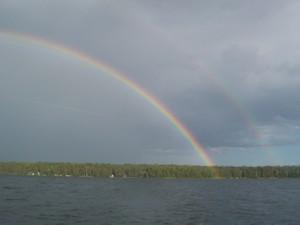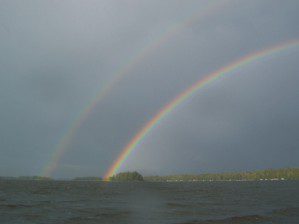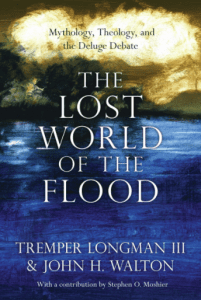 Well, perhaps not so much the end of the flood as the last post on the new book The Lost World of the Flood by Tremper Longman III and John Walton. As Old Testament scholars they have explored the ancient Near Eastern and biblical context of the flood narrative in Genesis 6-9. The book works through this context.
Well, perhaps not so much the end of the flood as the last post on the new book The Lost World of the Flood by Tremper Longman III and John Walton. As Old Testament scholars they have explored the ancient Near Eastern and biblical context of the flood narrative in Genesis 6-9. The book works through this context.
Tremper and John are convinced that the flood story has a real event behind it. They are also convinced that the author/compiler uses rhetorical hyperbole and figurative language in telling the story of the flood. Although the flood is portrayed as a global event, the flood itself need not have been a global. The universalizing language is an example of rhetorical hyperbole – a literary technique used in Scripture in a number of different places. Given the total absence of evidence for a global, flood they conclude that the flood was not global in extent. (Stephen Moshier, Professor of Geology at Wheaton contributes a chapter on the lack of evidence for a global flood.) The argument suggesting that worldwide flood stories support a global flood is also flawed. These stories are far from universal (they are rare to non-existent in regions where flooding doesn’t occur), they are very different in detail, and often make no reference to gods at all. Many of them can be traced back to the influence of the biblical story through Christian era missionary work.
 John and Tremper outline a few different possibilities for the actual flood behind the story, although none is certain. The most likely from their point of view (and I agree) is a flood ca. 5600 BC, potentially catastrophic far beyond normal river flooding in the region of the Black Sea. However, the mere fact of an actual flood isn’t really the point. The emphasis in Genesis is on the judgment of God through the flood and the mercy shown to Noah, his wife, his sons and their wives. God makes a covenant with Noah after the flood, a precursor to the covenant with Abraham.
John and Tremper outline a few different possibilities for the actual flood behind the story, although none is certain. The most likely from their point of view (and I agree) is a flood ca. 5600 BC, potentially catastrophic far beyond normal river flooding in the region of the Black Sea. However, the mere fact of an actual flood isn’t really the point. The emphasis in Genesis is on the judgment of God through the flood and the mercy shown to Noah, his wife, his sons and their wives. God makes a covenant with Noah after the flood, a precursor to the covenant with Abraham.
This leaves us with two choices as I see it (well, perhaps three – but the third isn’t exactly consistent with Christian doctrines of scripture).
- There was a real flood. It was an act of God in judgment on humans (at least the humans in the region). The story in Genesis 6-9 uses rhetorical hyperbole and figurative language, but faithfully recounts both judgment and the resulting covenant. It sets the stage for Genesis 12-50 and the rest of the biblical story. (I believe this is the option Tremper and John favor – although it wasn’t entirely clear in the book.)
- The flood narrative was well known to the ancient Israelites. It was part of their common knowledge. The author/compiler of Genesis uses this story to set the stage for the story of Israel. There was a real flood behind narrative, but the role of Yahweh, judgment, and covenant is used by the inspired author/compiler to provide a theological interpretation and to connect primeval history with the history of Israel.
For the second option, there need not have been a real flood – but it seems likely that there was some kind of catastrophic event that lead to the prevalent flood stories in the region. We also err if we dismiss the story as “just appropriated myth” under option 2. As God is maker of heaven and earth and in control of every event, it is not mere fabrication for the ancient Israelite community to see the hand of God in the flood event. Of course God was involved!
Both of these options (as well as the traditional global flood interpretation) are consistent with the overarching narrative of Scripture. John and Tremper outline this as Creation – Fall (into Sin) – Redemption – Consummation (p. 170). I prefer a slightly different outline: Creation – Human fallenness and God’s faithfulness – Redemption (the ultimate expression of God’s faithfulness) – Church – Consummation. Nothing we need to know for salvation depends on the specific interpretation of the flood narrative in Genesis 6-9.
(The third option removes any truth about God from the narrative making it nothing but ancient myth. This is not consistent with Christian views of Scripture.)
(Of course a fourth option is the traditional young earth – global flood interpretation. This option is not contrary to the faith – but does raise many questions and expose inconsistencies.)
 In their conclusion John and Tremper write:
In their conclusion John and Tremper write:
“Consequently, if we were to pose the question, why does the compiler of Genesis include Genesis 1-11? The answer would not be that he wanted us to know about these events. Rather he is using these well-known events of the past to help the reader understand how the covenant with Abraham fits into the flow of God’s plans and purposes for the cosmos, for his creatures, for his people, and for history.” (p. 179)
We read and study Scripture to know the flow of God’s plans and purposes. This includes Genesis 1-11.
The Lost World of the Flood is an easy book to read and well worth the time. There is much to ponder over and consider.
Which of the above options do you prefer?
If neither, what alternative would you offer?
If you wish to contact me directly you may do so at rjs4mail[at]att.net
If interested you can subscribe to a full text feed of my posts at Musings on Science and Theology.















